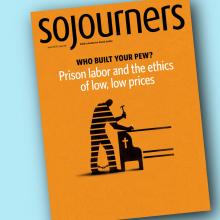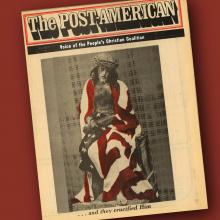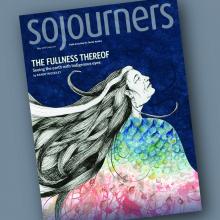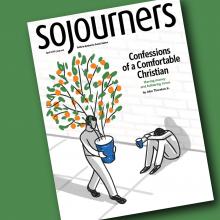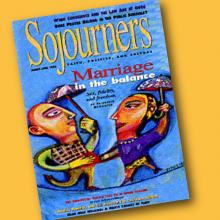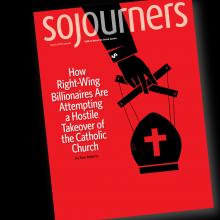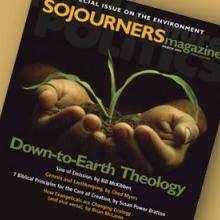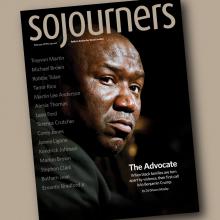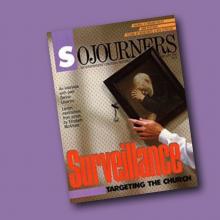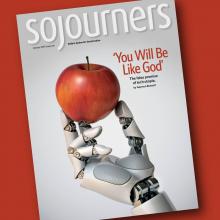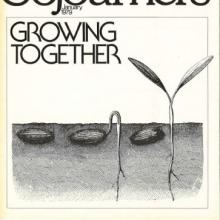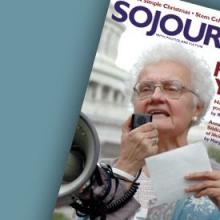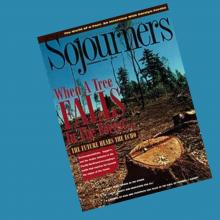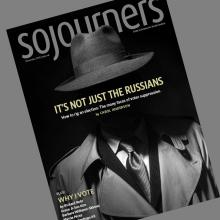Deaf people are equipped with theological and cultural gifts with which to enrich the life of the church.
Departments
We call upon deaf and hearing Christians alike to join together in this struggle toward freedom.
IN 2015, Pope Francis told inmates at Philadelphia’s Curran-Fromhold Correctional Facility that the purpose of prison is rehabilitation, “to give you a hand in getting back on the right road, to give you a hand to help you rejoin society.” The pontiff said these words in front of a throne-like walnut chair made for him by prisoners participating in Philacor, a program that, according to news coverage about the pope’s visit, offers job training in carpentry, catering, printing, and textiles to those behind bars.
I was hungry and
you blamed it on the communists
I was hungry and you
circled the moon
MAYBE YOU’VE HEARD a land acknowledgement at a conference, sporting event, or worship service. These brief statements name the Indigenous territory on which an event takes place, a small sign of respect to the people who stewarded this land for millennia and whose deep relationship to the land continues today. For any of us who’ve settled on that land, these statements are intentionally unsettling, a way “to counteract the ideologies operating in the Doctrine of Discovery by naming that the land was not empty when Europeans first arrived,” as one group of Canadian churches put it.
But land acknowledgements become trite—an easy checkmark in the social justice box—if they are not part of ongoing relationships with local Indigenous communities. These relationships must include settlers being quiet and listening to some hard truths from Indigenous people about history, responsibility, and reparations.
HE UGLY agony of Indochina is made all the more tortuous by the delusive refusal of this nation to accept the culpability for decades of a morally indefensible policy whose final failure is now being revealed.
The urge to believe that we have done what was somehow right and honorable leads us to wash our hands of any sin and then search to place on others the responsibility for the failure of American policy. So the administration blames the North Vietnamese for violating a treaty that was never initially respected by the South Vietnamese.
IF YOU PROVIDE 48 hours’ notice and $2,000, Industry Kitchen, a New York City restaurant near Wall Street, will serve you a pizza covered with edible 24-karat gold. In response to an article promising “7 gold-covered foods” that “will break your bank,” Washington Post opinion columnist Elizabeth Bruenig tweeted that “covering good food in expensive garbage” is “for rich people who have so much money they can’t think of anything else to do with it than literally turn it into [excrement].”
We don’t have that kind of money; our idea of fancy food is forking over an extra buck or two for avocado on our sandwich. But though we don’t eat gilded food, we have to confess that we’ve fallen short on following Jesus’ instructions to sell all we have and give to the poor. “I drive a car, go on vacation, and eat at restaurants with friends,” writes John Thornton in “What the Bible Doesn’t Say about Financial Security.” “I have health insurance, a bank account, and a job.” So do we.
Jesus on Line One
Afro-Latinx artist duendita’s EP direct line to My Creator confronts faith, doubt, and police violence against women of color in a powerful, prayerful debut. Fusing R&B, jazz, and soul, duendita conveys a striking range of emotion through rich, fluid vocals and ambient instrumentals. duendita.bandcamp.com
Spears into Pruning Hooks
Beating Guns: Hope for People Who Are Weary of Violence offers creative, Christ-centered responses to gun violence. Activist Shane Claiborne and Mennonite pastor-turned-blacksmith Michael Martin engage readers by interspersing the theology, history, and politics of guns with scripture, photos, quotes, and memorials to gun-violence victims. Brazos Press
This article originally appeared in the March-April 1996 issue of Sojourners. Read the full article in the archives.
THE POLITICAL leaders in place at this time are constructing social policy and vision that is fundamentally destructive of human life and well-being, particularly of those most marginalized by our governmental system. ... We must each choose the moment we step out of the line and take the consequences. ...
“SOJOURNERS IS MY favorite Catholic magazine,” readers occasionally tell us. Even though we’re an ecumenical Christian magazine with evangelical-ish roots, the compliment always makes us blush with pride. As we see it, if these pages resonate with Catholics, mainline Protestants, and evangelicals alike (as well as folks from Pentecostal, Orthodox, and other traditions), we must be doing something right.
In this interdenominational spirit, we publish “The Rise of the Catholic Right,” by Tom Roberts, executive editor of National Catholic Reporter. Through careful investigative work, Roberts offers an in-depth look at how private—and wealthy—conservative Catholic organizations are using money to exert undue influence in achieving their right-wing political and theological agendas.
PEOPLE WHO are sensitive to creation know that creation is in constant flux. Continents drift, climates change, magnetic poles flip-flop, and bogs gradually give way to wet meadows and then various kinds of forests. There’s a natural succession out here under the sun, and I think there’s a kind of natural succession going on theologically for many Christians as well. ...
First, increased concern for the poor and oppressed leads to increased concern for all of creation. The same forces that hurt widows and orphans, minorities and women, children and the elderly also hurt the songbirds and trout, the ferns and old growth forests: greed, impatience, selfishness, arrogance, hurry, anger, competition, irreverence—plus a spirituality that cares for souls but neglects bodies, that prepares for eternity in heaven but abandons history on earth. ...
“IT'S HARD TO imagine the average evangelical church embracing Mutesa’s colorful portraits of nude black joy,” writes Faith-Marie Zamblé in her profile of the young photographer whose work is rippled with laughter, face paint, and bare skin. Though the mood of Mimi Mutesa’s work is more exuberant than explicit, Zamblé is right: Blame it on the apple, Augustine, or purity culture, but many churches we know—evangelical or otherwise—blush when it comes to body parts, especially naked ones. Ever notice how crucifixes often have Jesus wearing a loincloth despite scripture’s insistence he was stripped?
We suspect Christian jitters around nudity are rooted in fear that naked bodies will arouse unholy sexual thoughts. But as Lutheran pastor Nadia Bolz-Weber points out, the church’s tendency to couple sexuality and sin has led to a sense of shame that many Christians find hard to shake. “I wonder how we could begin to honor sexual pleasure as something that can connect us more deeply to ourselves and others and God, yet still speak the truth about the ways in which our behaviors around sex can also do the opposite,” she writes in “Honor Thy Sexual Pleasure?” an excerpt from her forthcoming book, Shameless: A Sexual Reformation.
IMAGINE the refugee woman as the figure who replaces the hero in our consciousness. She is the archetype of our vulnerability fleshed out in the hostage, the homeless, the poor, the prisoner, the victim of human-made and natural disasters. Her image calls us to acknowledge that we are all vulnerable. No one is secure. It tells us that the more we cling to our securities, the more we become playthings of illusion. ...
"WE LIVE AS if the connections provided by digital technologies are vital,” writes Gaymon Bennett in the cover story, “and indeed we have made them so.”
Guilty as charged. Hang around the Sojourners office long enough and you’ll hear stories about how we used to keep a list of our subscribers in a shoebox and write articles on typewriters. But those days are done: Today our office hosts a congregation of laptops, tablets, screens, cameras, and smartphones that we need to access databases, send messages, and update our website. When a network upgrade happens to knock out the Wi-Fi, we all go home because, well, how could we work?
This article originally appeared in the January 1979 issue of Sojourners. Read the full article in the archives.
THE REAL WAY to be biblical and to respect biblical authority is to do what biblical people did and in the way that they did it. It is not to quote biblical sources or uncover the deep and secret meanings of biblical texts. The authority of words, even inspired words, must somehow be based in the de facto authority of accomplished deeds, redeemed peoples, and living bodies. In other words, it has to have worked somewhere, sometime, with someone, or it is an idealized abstraction. I find that a great many people who put themselves under the cope of religion are, in fact, people who enjoy ideology and abstraction as an escape from real commitment and real conversion.
IN THE PAST, the bulk of my Christmas shopping has usually been done between 10 a.m. and 3 p.m. on Christmas Eve. There’s something about waking up on the day before Christmas in a sheer panic that propels me straight into the open arms of every electronics, sporting goods, and department store within a 10-mile radius. While my family spends the morning sipping coffee, making red velvet cake, and cutting intricate little gift tags, I’ve spent the day with folks I’ve come to recognize as my extended family—a dysfunctional, wild-eyed bunch with a procrastination problem.
MAYBE YOU’VE NEVER noticed it, snuggled up there under our logo, on the cover of every issue: “Faith in action for social justice.” In magazine-speak, this slip of text is called the “tagline,” a snappy description of what the magazine is all about, and our tagline is a pretty good summary of what we try to do in Sojourners: faith, action, social justice—words that convey our call to imitate Jesus’ abiding love for those on the margins.
I REMEMBER one particularly troubling occasion at I.S. 61, Leonardo da Vinci Intermediate School in Queens. I was in sixth grade, class 6C, an SP (special progress) class. One day, midway through the school year, the assistant principal walked into my homeroom class and told me that I was being transferred into 6N. ... When you are 10 years old and in the third-ranked class in the sixth grade, to be told suddenly in front of your classmates that you are being transferred into the 14th-ranked class is embarrassing. In the few seconds it took for my mind to absorb this bad news and the shock of it, the opinion of my classmates of me changed from “peer” (meaning somewhat smart) to “dumb.”
HOW MANY WAYS can you say “resist”? In recent issues, we’ve urged people of faith to “challenge,” “subvert,” and “defy” the leaders and systems that run counter to Jesus’ message of abundance, inclusion, and love. We’ve shared stories of faith-fueled ways to “protest, “persist,” and “persevere.” And on more than one occasion, we’ve indulged in the old prophetic standby: “Speak truth to power.”
But the best synonyms for “resist” aren’t in a thesaurus. They’re words like “organize,” “accompany,” and, as we explore in this issue, “vote.” “Voting is simply the easiest part of the whole process for making positive change,” explains Randy Woodley. We agree: Voting should be easy, though as Carol Anderson explains in “It’s Not Just the Russians,” some officials are intentionally restricting voting access, especially for people of color. So don’t be tempted to think your vote is meaningless; it’s the very power of voting that such efforts seek to curtail. If you read nothing else in this issue, read this: Check your local voting guidelines and ensure you cast your ballot on Nov. 6.
Singing in Exile
On A Liturgy for the Perseverance of the Saints, Taiwanese-American artist SueAnn Shiah reimagines hymns “for those who have been driven out of the church because of their race, gender, or sexuality.” With warm vocals and spare arrangements, Shiah invokes hope for those currently “stranded in the wilderness.” sueannshiah.bandcamp.com
Faith and Imagination
In A Light So Lovely: The Spiritual Legacy of Madeleine L’Engle, Sarah Arthur digs deep into the personal journey of the influential and sometimes controversial A Wrinkle in Time author, revealing what L’Engle can continue to teach us. Zondervan
